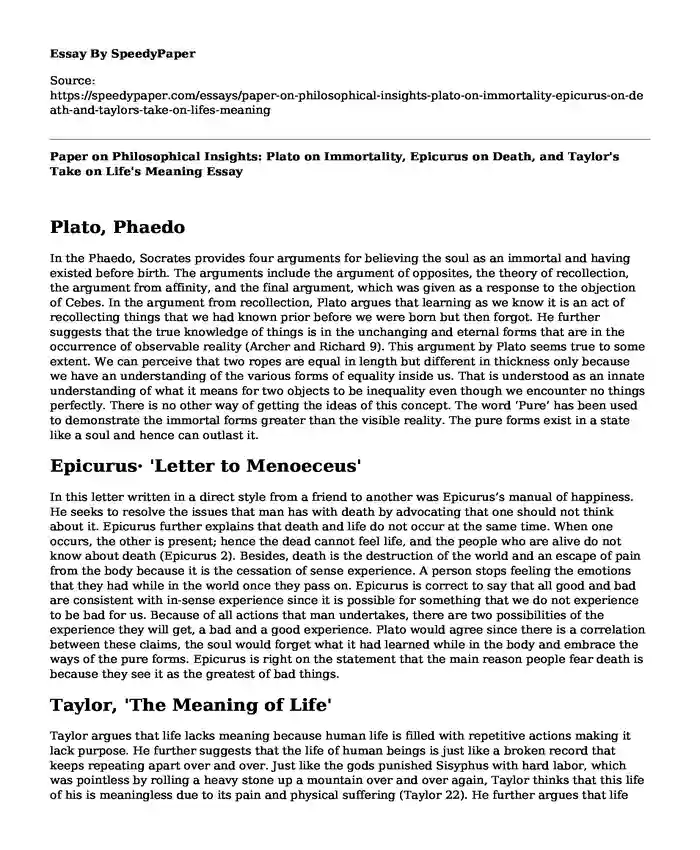
| Type of paper: | Essay |
| Categories: | Philosophy Plato |
| Pages: | 3 |
| Wordcount: | 696 words |
Plato, Phaedo
In the Phaedo, Socrates provides four arguments for believing the soul as an immortal and having existed before birth. The arguments include the argument of opposites, the theory of recollection, the argument from affinity, and the final argument, which was given as a response to the objection of Cebes. In the argument from recollection, Plato argues that learning as we know it is an act of recollecting things that we had known prior before we were born but then forgot. He further suggests that the true knowledge of things is in the unchanging and eternal forms that are in the occurrence of observable reality (Archer and Richard 9). This argument by Plato seems true to some extent. We can perceive that two ropes are equal in length but different in thickness only because we have an understanding of the various forms of equality inside us. That is understood as an innate understanding of what it means for two objects to be inequality even though we encounter no things perfectly. There is no other way of getting the ideas of this concept. The word ‘Pure’ has been used to demonstrate the immortal forms greater than the visible reality. The pure forms exist in a state like a soul and hence can outlast it.
Epicurus· 'Letter to Menoeceus'
In this letter written in a direct style from a friend to another was Epicurus’s manual of happiness. He seeks to resolve the issues that man has with death by advocating that one should not think about it. Epicurus further explains that death and life do not occur at the same time. When one occurs, the other is present; hence the dead cannot feel life, and the people who are alive do not know about death (Epicurus 2). Besides, death is the destruction of the world and an escape of pain from the body because it is the cessation of sense experience. A person stops feeling the emotions that they had while in the world once they pass on. Epicurus is correct to say that all good and bad are consistent with in-sense experience since it is possible for something that we do not experience to be bad for us. Because of all actions that man undertakes, there are two possibilities of the experience they will get, a bad and a good experience. Plato would agree since there is a correlation between these claims, the soul would forget what it had learned while in the body and embrace the ways of the pure forms. Epicurus is right on the statement that the main reason people fear death is because they see it as the greatest of bad things.
Taylor, 'The Meaning of Life'
Taylor argues that life lacks meaning because human life is filled with repetitive actions making it lack purpose. He further suggests that the life of human beings is just like a broken record that keeps repeating apart over and over. Just like the gods punished Sisyphus with hard labor, which was pointless by rolling a heavy stone up a mountain over and over again, Taylor thinks that this life of his is meaningless due to its pain and physical suffering (Taylor 22). He further argues that life can only be made beautiful by creating beautiful and long-lasting things like technology, architecture, and art. In his identification of the characteristics of meaningless life, Sisyphus's example was a great one since he later explains that if he made a big temple with the rocks at the top of the mountain, then his activities would not be pointless. Human beings have a more defining characteristic of meaninglessness than other biological life since humans can create a purpose with their lives like the creation of art. The subjective meaning that comes from within us is sufficient since it is happiness that matters. Everyone is responsible for making their meaning in life since it is possible to do so.
Works Cited
Archer-Hind, Richard Dacre, ed. The Phaedo of Plato. Macmillan and Company, 1883.
Epicurus, By. Letter to Menoeceus. University of Adelaide Library, 2004.
Taylor, Richard. "The meaning of life." Life, Death, & Meaning: Key Philosophical Readings on the Big Questions (1970).
Cite this page
Paper on Philosophical Insights: Plato on Immortality, Epicurus on Death, and Taylor's Take on Life's Meaning. (2024, Jan 05). Retrieved from https://speedypaper.net/essays/paper-on-philosophical-insights-plato-on-immortality-epicurus-on-death-and-taylors-take-on-lifes-meaning
Request Removal
If you are the original author of this essay and no longer wish to have it published on the SpeedyPaper website, please click below to request its removal:
- Kant's Distinction of the Noumenal World and the Phenomenal World, Free Essay
- Kantianism and Utilitarianism, Philosophy Essay Sample for You
- Essay Sample on the Socratic Method
- Free Essay: Does Bellamy Challenge Spencer?
- Free Essay Sample: Evaluation of Perspectives
- Free Essay: Ethics and Sustainability of Nuclear Energy
- Free Essay Sample - Humanities Analysis
Popular categories




